全国大学生英语竞赛经验
大学生英语竞赛心得[修改版]
![大学生英语竞赛心得[修改版]](https://img.taocdn.com/s3/m/5cc408a3b1717fd5360cba1aa8114431b90d8e6d.png)
第一篇:大学生英语竞赛心得一名“三朝元老”的大学英语竞赛心得自我介绍:大家好,我是饶浚弘,来自厦门理工学院数理系光信息科学与技术A班,我已经连续参加了08、09和10年的三次全国大学生英语竞赛,并且先后获得了全国三等奖、全国二等奖和全国一等奖,并将于今年5月9日代表我院参加在福州举行的福建赛区的决赛。
在这里我想和各位英语爱好者一起交流一下我的一些经验和心得,希望能对大家有所帮助,也希望能和大家多多交流,以英语会友,共同进步,谢谢!平时学习积累的经验:“罗马不是一天筑成的”,我想,要学好英语也不是单靠几天的努力或者考前的突击就能实现的。
英语是一门语言,而要学好它,我觉得关键还是要在平时多下功夫,贵在积累和坚持。
“业精于勤,荒于嬉。
”一分耕耘一分收获,我之所以能够取得不错的成绩,也是和我中学起就努力学习英语分不开的。
说到具体的模块的话,英语不外乎就是听、说、读、写、译五块。
先说说听力,听力的话我平时除了听一些课本和练习的听力外,还有听一些VOA或者电台的新闻,VOA总的来说还是语速相对较慢,比较适合初学者。
而电台的整点时间播报难度就比较大了,信息量很大,一开始听都很不知所措,不过其实还是要在练习中多总结一些规律和方法才能提高。
说的话其实是我们中国大学生的普遍弱项了,口语要想提高的话还是要多开口,多说,多练。
不要怕犯错,我想每个学校应该都有英语角之类的活动吧,有的话要积极去参与。
可能一开始效果不明显,但是次数多了就会不同,还有要注意学以致用,把最近学的一些新的知识点应用到对话中去,加深对知识的理解和掌握。
阅读的话我不怎么赞成死记硬背单词,要多阅读,看杂志、报纸之类的,总之只要是英语的都行。
阅读时,遇到不认识的单词,也不要急于去查词典,先猜一下词义;如果实在猜不出再去查,这样才会记得比较牢。
阅读主要是一个关键词定位的问题,要掌握一些技巧来加快做题速度,又对又快是我们的目标。
写作的话也是要勤于动笔,平时要积累一些好词好句,谚语和过渡词吧,套用到文章中去。
大英竞赛技巧

大英竞赛技巧大英竞赛是一项全球性的英语语言能力测试,旨在评估参赛者的英语水平。
对于想要参加大英竞赛的人来说,了解一些技巧和策略可以帮助他们在考试中取得更好的成绩。
以下是一些关于大英竞赛技巧的主要内容。
1. 了解考试结构和题型在参加大英竞赛之前,必须了解考试结构和题型。
该考试分为听力、阅读、写作和口语四个部分,每个部分都有不同的题型和时间限制。
听力部分包括短对话、长对话和短文听力,需要仔细倾听并理解所听到的内容。
阅读部分包括多项选择题、填空题和匹配题等,需要阅读文章并回答相关问题。
写作部分则要求参赛者根据所给主题撰写一篇文章或写一个简短的作文。
最后是口语部分,需要参赛者回答面试官提出的问题或进行演讲。
2. 练习听力技能听力是大英竞赛中最具挑战性的部分之一。
因此,建议参赛者在考试前练习听力技能。
可以通过听英语广播、看英语电影或参加英语口语班等方式提高听力水平。
3. 阅读速度和理解能力阅读部分需要参赛者快速阅读并理解文章内容。
因此,建议参赛者在考试前练习阅读速度和理解能力。
可以通过阅读英文报纸、杂志或小说等方式提高自己的阅读能力。
4. 提高写作技能写作是大英竞赛中最重要的部分之一。
建议参赛者在考试前提前准备并练习写作技能。
可以通过写日记、文章或练习写作题目等方式提高自己的写作水平。
5. 口语练习口语部分需要参赛者流利地表达自己的想法和观点。
因此,建议参赛者在考试前练习口语技能。
可以通过与朋友交流、参加英语角或进行模拟面试等方式提高自己的口语水平。
6. 注意时间管理大英竞赛中每个部分都有时间限制,因此,注意时间管理非常重要。
建议参赛者在考试前仔细研究每个部分的时间限制,并根据时间安排合理地分配时间。
总之,大英竞赛是一项考验英语水平的重要考试。
参赛者需要在考试前充分准备,掌握一些技巧和策略,才能取得更好的成绩。
大学生英语比赛感言

大家好!在这阳光明媚、充满活力的日子里,我有幸参加了这次大学生英语比赛。
首先,我要感谢学校为我们提供了这样一个展示自我、锻炼能力的平台,感谢评委老师们辛勤的付出和专业的指导,还要感谢我的同学们在我备战比赛期间给予的支持和鼓励。
此刻,我想借此机会,向大家分享我的参赛感受和心得体会。
一、参赛初衷作为一名大学生,英语是我们必须掌握的一门语言。
在全球化日益加深的今天,英语已经成为国际交流的重要工具。
为了提高自己的英语水平,我积极参加各类英语比赛,希望通过比赛锻炼自己的口语表达能力、思维敏捷度和团队协作能力。
此次比赛,我更是全力以赴,希望通过自己的努力,在比赛中取得优异成绩。
二、备赛过程备赛期间,我深知自己肩负着荣誉和责任。
为了在比赛中脱颖而出,我制定了详细的备赛计划,并严格按照计划执行。
以下是我备赛过程中的一些心得体会:1. 坚持每天练习口语。
备赛期间,我每天都会花费一定的时间练习口语,包括朗读、背诵、模拟演讲等。
通过不断练习,我的口语水平得到了很大提高。
2. 广泛阅读英语文章。
为了拓宽知识面,我阅读了大量的英语文章,包括新闻报道、科普文章、文学作品等。
这不仅让我积累了丰富的词汇,还提高了我的阅读速度和理解能力。
3. 观看英语电影和电视剧。
通过观看英语电影和电视剧,我学会了如何运用英语进行交流,并熟悉了不同口音的英语表达方式。
4. 参加英语角和口语比赛。
为了检验自己的学习成果,我积极参加学校举办的英语角和口语比赛。
在这些活动中,我结识了许多志同道合的朋友,与他们交流学习心得,共同进步。
5. 请教老师和同学。
在备赛过程中,我遇到了很多难题,每当这时,我都会向老师请教,或者向同学寻求帮助。
他们的鼓励和支持让我更加坚定了参赛的信心。
三、比赛感悟1. 勇于挑战自我。
参加比赛,对我来说是一次全新的挑战。
在比赛中,我充分认识到自己的不足,但同时也学会了如何面对挑战,勇敢地去突破自己。
2. 团队协作的重要性。
在比赛中,我深刻体会到团队协作的重要性。
全国大学生英语竞赛复习资料

全国大学生英语竞赛复习资料全国大学生英语竞赛是一项具有很高水平和广泛影响力的比赛,全面考察了参赛者在听、说、读、写、译等方面的英语语言运用能力。
参加这样的比赛,不仅是对自己英语水平的检验和提高,也是一种锻炼自我的机会。
为此,如何有针对性地进行英语竞赛复习是至关重要的。
第一步是准确掌握考试大纲和题型。
考试大纲中明确了比赛的特点、考察的内容和试题难度分布等重要内容。
对于不同的竞赛级别,程序和要求也各不相同。
参赛者应该通过细致的了解大纲,规划出适合自己的复习计划,针对性地进行练习和强化。
第二步是找到合适的教材和资料。
英语教材难度和内容繁多,对于想要参加英语竞赛的学生来说,选择适合个人英语水平及考试难度的教材和资料是非常重要的。
首先可以根据自己的水平,选择不同级别、不同类型的英语书籍和在线学习资源。
其次,可以通过查看历年英语竞赛真题和参考资料,了解考试难度和常见题型,快速适应考试的时间限制和答题要求。
选取合适的教材和资料,可以帮助竞赛参赛者更有效地复习和提高英语水平。
第三步是实践口语和写作。
英语口语和写作在竞赛中占据重要的地位,需要特别注重训练和练习。
针对口语,可以通过模拟比赛考场,在较小范围内进行模拟练习,提高答题速度和语言流畅度。
同时,参赛者还可以通过参加口语俱乐部和在线社区,与其他英语爱好者进行交流和分享,提高英语口语交际能力。
针对写作,建立一个良好的写作习惯和技巧也是至关重要的。
多阅读写作范文,学习写作技法和结构,提高写作的逻辑和语言水平。
适当调整写作语言和风格,提高英语写作能力,也能够在竞赛中取得更好的成绩。
第四步是注重细节和备战心态。
在复习和备战过程中,为了更有效地进行练习和备考,竞赛参赛者还需要注重一些细节和备战心态。
例如,设立时间表,合理安排考试准备时间和应对策略,不能轻视任何一次模拟考试,警惕一次次跨越式进步的机会。
同时,也应该注意保持身心健康,准备和参加竞赛的过程中,良好的心态和饮食习惯等方面的把控,能够更好地发挥自己的潜力,取得更好的成绩。
大英竞赛技巧
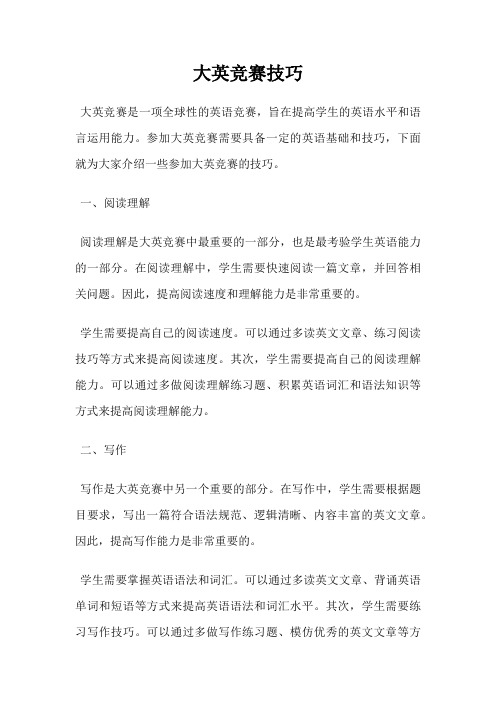
大英竞赛技巧大英竞赛是一项全球性的英语竞赛,旨在提高学生的英语水平和语言运用能力。
参加大英竞赛需要具备一定的英语基础和技巧,下面就为大家介绍一些参加大英竞赛的技巧。
一、阅读理解阅读理解是大英竞赛中最重要的一部分,也是最考验学生英语能力的一部分。
在阅读理解中,学生需要快速阅读一篇文章,并回答相关问题。
因此,提高阅读速度和理解能力是非常重要的。
学生需要提高自己的阅读速度。
可以通过多读英文文章、练习阅读技巧等方式来提高阅读速度。
其次,学生需要提高自己的阅读理解能力。
可以通过多做阅读理解练习题、积累英语词汇和语法知识等方式来提高阅读理解能力。
二、写作写作是大英竞赛中另一个重要的部分。
在写作中,学生需要根据题目要求,写出一篇符合语法规范、逻辑清晰、内容丰富的英文文章。
因此,提高写作能力是非常重要的。
学生需要掌握英语语法和词汇。
可以通过多读英文文章、背诵英语单词和短语等方式来提高英语语法和词汇水平。
其次,学生需要练习写作技巧。
可以通过多做写作练习题、模仿优秀的英文文章等方式来提高写作技巧。
三、口语口语是大英竞赛中另一个重要的部分。
在口语中,学生需要根据题目要求,用英语进行口头表达。
因此,提高口语能力是非常重要的。
学生需要提高自己的英语发音和语调。
可以通过模仿英语母语人士的发音和语调、多听英语广播和电视节目等方式来提高英语发音和语调。
其次,学生需要练习口语表达能力。
可以通过多做口语练习题、和英语母语人士进行交流等方式来提高口语表达能力。
参加大英竞赛需要具备一定的英语基础和技巧。
通过提高阅读理解能力、写作能力和口语能力,可以更好地参加大英竞赛,提高自己的英语水平和语言运用能力。
大学生英语竞赛:我的个人总结与感悟

大学生英语竞赛:我的个人总结与感悟大学生英语竞赛:我的个人总结与感悟时光荏苒,转眼间又到了2023年,作为一名大学生,我一直特别注重英语学习和思考如何提高自己的英语水平。
在我的学习生涯中,参加各种英语竞赛成为了我提高英语能力的有效途径之一,其中大学生英语竞赛也成为了我学习英语的一个重要组成部分。
在本文中,我将会分享我参加大学生英语竞赛的经验以及一些个人感悟,希望对广大学生在英语学习上提供一些借鉴和启示。
一、参赛经历在我的大学生涯中,我曾经参加过多次大学生英语竞赛,包括全国大学生英语竞赛、MTI-CET英语国际翻译大赛等。
在这些竞赛中,我收获了很多,也有很多经验值得分享。
首先,在我准备参加比赛的时候,我开始了系统的练习,包括听、说、读、写、译等方面。
我每天都会花时间听英文新闻、看英文电影、练习口语、读英文文章和翻译练习等,持之以恒地练习让我在后来的比赛中受益匪浅。
其次,我也很注重英语语法的学习,这是提高英文写作和翻译能力的必要条件。
我经常通过学习英语语法书籍,加上大量的练习来提高自己的语法能力。
在语法方面做得好,写作和翻译的能力也会自然提升。
此外,我还善于总结和归纳我的错误经验。
在比赛过程中,我经常会遇到翻译或者写作中的问题,如何快速而准确地解决问题是取得好成绩的关键。
因此,在比赛的过程中,我会留意自己遇到的问题并进行总结,然后研究解决方法并加以实践。
这样的方法让我在比赛中更加得心应手。
最后,在我的比赛经历中,最重要的就是自信心的培养。
在比赛中, 自信是非常重要的,因为自信会让你变得自然、流畅,有信心和勇气去说和写。
在我的学习生涯中,我获得的一些荣誉和夺得的一些奖项让我信心倍增,从而更加专注和自信地投入到英语学习中去。
二、我对英语竞赛的感悟参加大学生英语竞赛不仅是对自己英语水平的检验和提高,同时还能体验到竞赛的激情和快乐。
英语竞赛对我来说不仅仅是一场比赛,更是一个人生经验的积累。
以下是我的一些感悟:1.英语是一门语言,也是一项技能英语并不是一门纯粹的学科,更是一项技能。
大英赛知识点
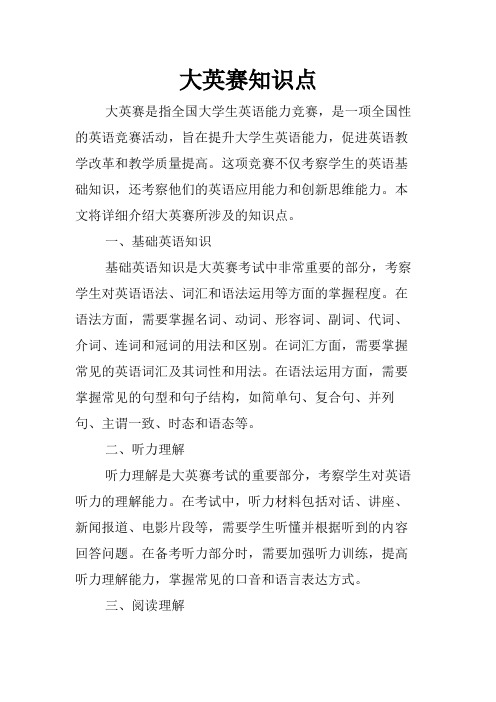
大英赛知识点大英赛是指全国大学生英语能力竞赛,是一项全国性的英语竞赛活动,旨在提升大学生英语能力,促进英语教学改革和教学质量提高。
这项竞赛不仅考察学生的英语基础知识,还考察他们的英语应用能力和创新思维能力。
本文将详细介绍大英赛所涉及的知识点。
一、基础英语知识基础英语知识是大英赛考试中非常重要的部分,考察学生对英语语法、词汇和语法运用等方面的掌握程度。
在语法方面,需要掌握名词、动词、形容词、副词、代词、介词、连词和冠词的用法和区别。
在词汇方面,需要掌握常见的英语词汇及其词性和用法。
在语法运用方面,需要掌握常见的句型和句子结构,如简单句、复合句、并列句、主谓一致、时态和语态等。
二、听力理解听力理解是大英赛考试的重要部分,考察学生对英语听力的理解能力。
在考试中,听力材料包括对话、讲座、新闻报道、电影片段等,需要学生听懂并根据听到的内容回答问题。
在备考听力部分时,需要加强听力训练,提高听力理解能力,掌握常见的口音和语言表达方式。
三、阅读理解阅读理解是大英赛考试的另一个重要部分,考察学生对英语阅读的理解能力。
在考试中,阅读材料包括新闻报道、专业文章、小说等,需要学生阅读并根据阅读内容回答问题。
在备考阅读部分时,需要加强阅读训练,提高阅读理解能力,掌握常见的阅读策略和技巧。
四、写作能力写作能力是大英赛考试的重要组成部分,考察学生的英语写作能力。
在考试中,写作题目一般包括议论文、作文、翻译等,需要学生在规定时间内完成。
在备考写作部分时,需要多进行写作训练,提高写作水平,掌握常见的写作技巧和方法。
五、口语表达口语表达是大英赛考试的重要部分,考察学生的英语口语表达能力。
在考试中,口语表达包括口语考试、演讲、辩论等,需要学生在规定时间内完成。
在备考口语部分时,需要多进行口语训练,提高口语表达能力,掌握常见的口语技巧和方法。
六、跨文化交际跨文化交际是大英赛考试的另一个重要部分,考察学生在跨文化交际方面的能力。
在考试中,需要学生了解并掌握不同文化之间的差异,了解和尊重不同文化的习惯和做法。
全国大学生英语竞赛指南

全国大学生英语竞赛指南English:The National College English Competition is an annual event held for university students across the country to showcase their English language skills in various categories such as speaking, writing, listening, and reading. This competition not only provides a platform for students to demonstrate their proficiency in English but also encourages them to improve their language abilities through preparation and participation. Participants can expect to be challenged with tasks that test their grammar, vocabulary, comprehension, and critical thinking skills. In addition to the competitive aspect, the competition also fosters camaraderie among students who share a passion for learning English. Winners of the competition receive recognition for their hard work and dedication to mastering the English language, as well as valuable prizes and opportunities for further academic and career development. By participating in the National College English Competition, students can enhance their language proficiency, gain confidence in their abilities, and expand their knowledge and understanding of the English language and culture.中文翻译:全国大学生英语竞赛是一年一度的活动,旨在为全国各大学生展示他们在口语、写作、听力和阅读等各个领域的英语语言技能。
全国大学生英语竞赛(B类)初赛赛前备考及应试技巧
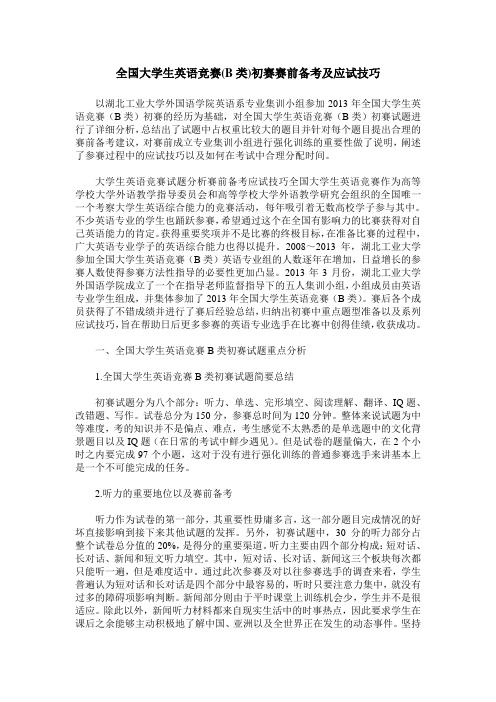
全国大学生英语竞赛(B类)初赛赛前备考及应试技巧以湖北工业大学外国语学院英语系专业集训小组参加2013年全国大学生英语竞赛(B类)初赛的经历为基础,对全国大学生英语竞赛(B类)初赛试题进行了详细分析,总结出了试题中占权重比较大的题目并针对每个题目提出合理的赛前备考建议,对赛前成立专业集训小组进行强化训练的重要性做了说明,阐述了参赛过程中的应试技巧以及如何在考试中合理分配时间。
大学生英语竞赛试题分析赛前备考应试技巧全国大学生英语竞赛作为高等学校大学外语教学指导委员会和高等学校大学外语教学研究会组织的全国唯一一个考察大学生英语综合能力的竞赛活动,每年吸引着无数高校学子参与其中。
不少英语专业的学生也踊跃参赛,希望通过这个在全国有影响力的比赛获得对自己英语能力的肯定。
获得重要奖项并不是比赛的终极目标,在准备比赛的过程中,广大英语专业学子的英语综合能力也得以提升。
2008~2013年,湖北工业大学参加全国大学生英语竞赛(B类)英语专业组的人数逐年在增加,日益增长的参赛人数使得参赛方法性指导的必要性更加凸显。
2013年3月份,湖北工业大学外国语学院成立了一个在指导老师监督指导下的五人集训小组,小组成员由英语专业学生组成,并集体参加了2013年全国大学生英语竞赛(B类)。
赛后各个成员获得了不错成绩并进行了赛后经验总结,归纳出初赛中重点题型准备以及系列应试技巧,旨在帮助日后更多参赛的英语专业选手在比赛中创得佳绩,收获成功。
一、全国大学生英语竞赛B类初赛试题重点分析1.全国大学生英语竞赛B类初赛试题简要总结初赛试题分为八个部分:听力、单选、完形填空、阅读理解、翻译、IQ题、改错题、写作。
试卷总分为150分,参赛总时间为120分钟。
整体来说试题为中等难度,考的知识并不是偏点、难点,考生感觉不太熟悉的是单选题中的文化背景题目以及IQ题(在日常的考试中鲜少遇见)。
但是试卷的题量偏大,在2个小时之内要完成97个小题,这对于没有进行强化训练的普通参赛选手来讲基本上是一个不可能完成的任务。
大英赛简介及技巧

2. 答题技巧
大英赛简介及技巧
一、全国大学生英语竞赛简介
全称:National English Contest for College Students
简称:NECCS 主办:高等学校大学外语教学指导委员会
高等学校大学外语教学研究会 官网:
性质:全国唯一的大学生英语综合能力竞赛 活动
大英赛简介及技巧
• 命题范围:
各类考试的初赛和决赛赛题的命题将依据《非英语专 业研究生英语教学大纲》、《高等学校英语专业英语 教学大纲》、《大学英语课程要求(试行)》、《高 职高专教育英语课程教学基本要求》等文件,并借鉴 国内外最新的测试理论和命题技术、方法,既要参考 现行各种大学英语主要教材,又不依据任何一种教材; 既要贴近当代大学生的学习和生活, 又要有利于检测 出参赛大学生的实际英语水平。本竞赛的初、决赛赛 题注意信度和效度,内容上体现真实性、实用性、交 流性和时代性。
第一部分: 听力理解 ( Part I Listening Comprehension )
• 考核要求:考查考生获取口头信息的能力(理解主 旨大意、听懂重要的事实和细节、推断隐含的意义、 判断言语的交际功能、分辨说话人的观点态度等), 要求考生在听完听力材料后了解内容大意,抓住有关 细节,并能进行综合归纳、推理,领会说话人的观点、 态度、意图等。语速为每分钟150词左右(相当于CET 6级)。
奖励:以参赛人数为基础,一至三等奖占 6%,优胜奖占27%,奖励面33%。
大英赛简介及技巧
参赛对象: • 本竞赛分A、B、C、D四个类别,全国各高校研究生
及本、专科所有年级学生均可自愿报名参赛。A类考 试适用于研究生参加;B类考试适用于英语专业本、 专科学生参加;C类考试适用于非英语专业本科生参 加;D类考试适用于体育类和艺术类本科生和非英语 专业高职高专类学生参加。 • 本竞赛面向大多数学生,提倡“重在参与”的奥林匹克 精神,坚持自愿报名参加的原则,避免仅仅选拔“尖子” 参加竞赛,而把大多数学生排除在竞赛之外的做法。
全国大学生英语竞赛是什么类别的比赛 难不难

全国大学生英语竞赛是什么类别的比赛难不难
全国大学生英语竞赛是什幺,难度怎幺样呢?小编今天来为大家分享一下!
什幺是全国大学生英语竞赛全国大学生英语竞赛(National English Competition for College Students, 简称NECCS)是经教育部有关部门批准,是由教育部高等学校大学外语教学指导委员会和高等学校大学外语教学研究会联合主办,天仁报业集团英语辅导报社、考试与评价杂志社承办的全国唯一的大学生英语综合能力竞赛。
是全国性大学英语学科竞赛,旨在促进大学各类英语教学改革的实施,全面提高大学生英语综合运用能力,激发广大大学生学习英语的积极性,鼓励大学英语学习成绩优秀的大学生。
全国大学生英语竞赛和四六级题型不一样,性质也不一样。
这个是属于“选拔性”考试,所以难度还是有的。
大概的排名:大学英语4级全国大学生英语竞赛分为A、B、C、D四大类。
A类考试适用于研究生参加;
B类考试适用于英语专业本、专科学生参加;
C类考试适用于非英语专业本科生参加;
D类考试适用于体育类和艺术类的本科生和非英语专业高职高专类学生参加。
全国大学生英语竞赛备考经验1、听力备考要针对短对话和写单词重点展开。
听到什幺不选什幺、掌握些基本的速记技巧、平时要注意单词的拼写、熟悉语音拼读规则、保持听力练习。
2、做阅读题的时候要根据题目合理的学会联系上下文和总结大意,题目顺。
英语竞赛心得体会(精选5篇)

英语竞赛心得体会英语竞赛心得体会(精选5篇)英语竞赛心得体会篇1初赛后,经过几轮激烈的筛选与淘汰,有幸参加5月13日在浙工大举行的决赛。
以下是我所做的一些准备工作。
首先,老师针对几个重要的题型对我们进行培训:两次口语培训(第一次应老师讲了口语考试应该注意的事以及如何取得高分的技巧;第二次骆老师详细分析了口语考试题型,并让同学轮流回答并指出其中问题),一次是针对改错的培训(我们在课上做了一些老六级的改错,熟悉了常见的改错类型。
剩下的习题课后完成,用来练笔)。
最后一次培训,老师回答了一些常见问题,并讲了注意事项。
其次,遵照老师建议,我在卓越上买了一本大学生英语竞赛历年真题(20xx—20xx初赛与决赛题),从4月28日确定决赛名单到竞赛前定时操练。
一来熟悉题型,二来练手感。
因为自己已是大三学生,参加过前两年的竞赛,对竞赛题型比较熟悉,这次做真题又温习了一下当年考过的试卷,有种似曾相识之感,同时也发现很多容易想当然做错的题目。
考试前一星期,我有意识地选了往年的作文题,写了几篇大作文,一是调用一下词汇,二是训练一下速度。
另外,由于口语占考试分值的50%,骆老师建议我们每天至少选五个题目进行演练,此外可以参考雅思口试中常见问题的回答,积累一些高级词汇。
我的准备是打印老师提供的历届口语试题,主要是freetalk和generaltopic,自已进行演练,对一些较难的题目,写下要点。
这样经常演练的结果是流利度提高了,给人“滔滔不绝”的感觉出来了,同时发现话题间可以相互套,一些话其实是可以通用的。
我个人认为B类初赛与决赛难度相差不大,题型一致,关键还是时间问题。
此次决赛听力是外放的,大家普遍说个别听得不够清楚,原因主要还是我们习惯了带着耳机听,不够适应,另外可能是外放会受到隔壁喇叭的干扰。
选择题、完型、阅读、翻译题目比较稳定;改错由于事先有准备,改起来比较快;智力题确定地答了两道,另外三道瞎蒙(回去查了一下,knot是速度的一个单位,答错了);作文由于前几天有热身,写得很快,大概30分钟就写完了。
全国英语大学生竞赛2篇
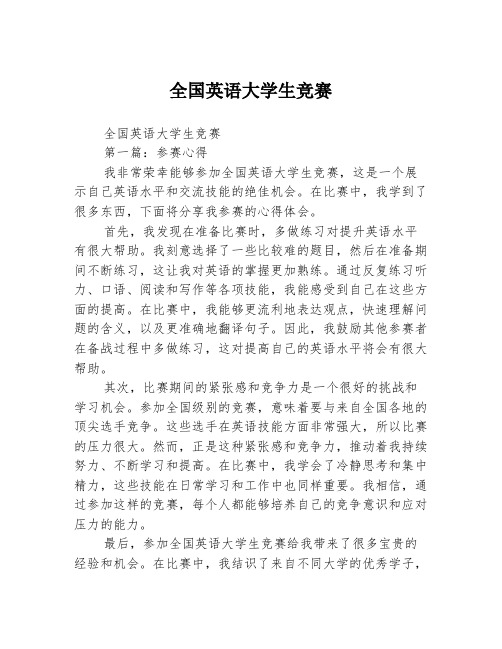
全国英语大学生竞赛全国英语大学生竞赛第一篇:参赛心得我非常荣幸能够参加全国英语大学生竞赛,这是一个展示自己英语水平和交流技能的绝佳机会。
在比赛中,我学到了很多东西,下面将分享我参赛的心得体会。
首先,我发现在准备比赛时,多做练习对提升英语水平有很大帮助。
我刻意选择了一些比较难的题目,然后在准备期间不断练习,这让我对英语的掌握更加熟练。
通过反复练习听力、口语、阅读和写作等各项技能,我能感受到自己在这些方面的提高。
在比赛中,我能够更流利地表达观点,快速理解问题的含义,以及更准确地翻译句子。
因此,我鼓励其他参赛者在备战过程中多做练习,这对提高自己的英语水平将会有很大帮助。
其次,比赛期间的紧张感和竞争力是一个很好的挑战和学习机会。
参加全国级别的竞赛,意味着要与来自全国各地的顶尖选手竞争。
这些选手在英语技能方面非常强大,所以比赛的压力很大。
然而,正是这种紧张感和竞争力,推动着我持续努力、不断学习和提高。
在比赛中,我学会了冷静思考和集中精力,这些技能在日常学习和工作中也同样重要。
我相信,通过参加这样的竞赛,每个人都能够培养自己的竞争意识和应对压力的能力。
最后,参加全国英语大学生竞赛给我带来了很多宝贵的经验和机会。
在比赛中,我结识了来自不同大学的优秀学子,我们共同分享了学习心得和学习方法。
这不仅拓宽了我的人际关系网络,还让我了解到了其他学校的教育和学习氛围。
此外,比赛还为我提供了展示自己的舞台,我能够向评委和观众展示我对英语的理解和应用能力。
这种经历对我今后的学习和就业都有很大的帮助。
总的来说,参加全国英语大学生竞赛是一次让我受益匪浅的经历。
通过这个比赛,我不仅提高了自己的英语水平,还学到了很多能力和经验。
我鼓励其他大学生也参加这样的竞赛,相信你们也能从中受益,并取得更大的成功。
第二篇:比赛回顾与展望回顾这次全国英语大学生竞赛的经历,我能够感受到自己在英语学习和交流方面的进步。
这次比赛是我第一次参加如此高规格的竞赛,对我来说是一个宝贵的机会和挑战。
大英赛简介及技巧

第五部分 翻译 translation
• 5小题,每题2分,共计10分,建议5分钟左右。 • 考核形式:汉译英,英译汉
第六部分 改错 Error correction
• 10小题,每题1分,共10分,建议10分钟左右 • 考核要求:要求学生能用语法、修辞、结构等 语言知识识别短文的语病并改正。
第七部分 智力测试 IQ Test
备战建议
提高阅读理解能力,首先应该树立、培养 良好的默读习惯,克服、减少现有的各种不良 阅读习惯,以提升阅读速度和效率。常见的不 良阅读习惯包括逐字阅读、出声阅读、唇读、 喉读、心读、指字阅读、摆头、回读等。
备战建议
提高英语阅读能力需要具备以下素质 1 2 3
备战建议
众所周知,扎实的语法和丰富的词汇是提 高阅读速度和理解能力的基础和必备条件,广 阔的文化背景知识是促进理解内容的重要因素。 掌握不同的阅读技巧会使阅读过程得心应手, 提高解题速度和正确率。
全国大学英语竞赛 赛前剖析
NECCS
一、全国大学生英语竞赛简介
全称:National English Contest for College Students 简称:NECCS 主办:高等学校大学外语教学指导委员会 高等学校大学外语教学研究会 官网:
性质:全国唯一的大学生英语综合能力竞赛 活动
竞赛进程
初赛 满分150分 (笔试) 决赛 满分150分
(笔试、口试)
全国总决赛 满分200分
(笔试、口试 )
奖励等级: • 本次竞赛四个类别均设四个国家奖励等级:特 等奖、一等奖、二等奖和三等奖。二等奖和三 等奖通过初赛产生。特等奖和一等奖通过决赛 产生,由省(自治区、直辖市)竞赛组织机构根 据决赛成绩确定。
全国大学生英语竞赛决赛-口语考试经验
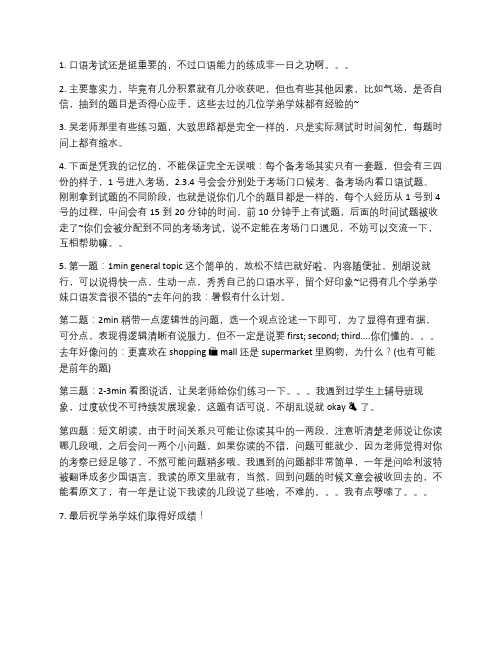
1. 口语考试还是挺重要的,不过口语能力的练成非一日之功啊。
2. 主要靠实力,毕竟有几分积累就有几分收获吧,但也有些其他因素,比如气场,是否自信,抽到的题目是否得心应手,这些去过的几位学弟学妹都有经验的~3. 吴老师那里有些练习题,大致思路都是完全一样的,只是实际测试时时间匆忙,每题时间上都有缩水。
4. 下面是凭我的记忆的,不能保证完全无误哦:每个备考场其实只有一套题,但会有三四份的样子,1号进入考场,2.3.4号会会分别处于考场门口候考、备考场内看口语试题、刚刚拿到试题的不同阶段,也就是说你们几个的题目都是一样的,每个人经历从1号到4号的过程,中间会有15到20分钟的时间,前10分钟手上有试题,后面的时间试题被收走了~你们会被分配到不同的考场考试,说不定能在考场门口遇见,不妨可以交流一下,互相帮助嘛。
5. 第一题:1min general topic 这个简单的,放松不结巴就好啦,内容随便扯,别胡说就行,可以说得快一点,生动一点,秀秀自己的口语水平,留个好印象~记得有几个学弟学妹口语发音很不错的~去年问的我:暑假有什么计划。
第二题:2min 稍带一点逻辑性的问题,选一个观点论述一下即可,为了显得有理有据,可分点,表现得逻辑清晰有说服力,但不一定是说要 first; second; third....你们懂的。
去年好像问的:更喜欢在 shopping mall 还是 supermarket 里购物,为什么?(也有可能是前年的题)第三题:2-3min 看图说话,让吴老师给你们练习一下。
我遇到过学生上辅导班现象,过度砍伐不可持续发展现象,这题有话可说,不胡乱说就okay 了。
第四题:短文朗读,由于时间关系只可能让你读其中的一两段,注意听清楚老师说让你读哪几段哦,之后会问一两个小问题,如果你读的不错,问题可能就少,因为老师觉得对你的考察已经足够了,不然可能问题稍多哦。
我遇到的问题都非常简单,一年是问哈利波特被翻译成多少国语言,我读的原文里就有,当然,回到问题的时候文章会被收回去的,不能看原文了,有一年是让说下我读的几段说了些啥,不难的。
全国大学生英语竞赛感言

时光荏苒,岁月如梭。
转眼间,全国大学生英语竞赛已经圆满落下帷幕。
在这场激烈的比赛中,我不仅收获了宝贵的英语知识,更收获了成长与感悟。
在此,我想借此机会,对全国大学生英语竞赛表达我的衷心感谢和感慨。
首先,我要感谢全国大学生英语竞赛组委会,为我们提供了这样一个展示自我、挑战自我的平台。
通过这个比赛,我们得以结识来自五湖四海的优秀学子,共同切磋英语技艺,相互学习,共同进步。
同时,也要感谢我的指导老师,他们用自己的辛勤付出,为我提供了宝贵的指导和建议,使我能够在比赛中取得优异成绩。
回顾比赛过程,我感慨万分。
比赛之初,我满怀信心,相信自己能够在比赛中脱颖而出。
然而,随着比赛的深入,我逐渐意识到英语学习的艰辛。
比赛过程中,我遇到了许多困难,如听力、阅读、写作等方面的挑战。
但正是这些挑战,让我更加坚定了学习英语的决心。
在比赛过程中,我深刻体会到了英语学习的重要性。
英语作为一门国际通用语言,已经成为我们生活中不可或缺的一部分。
在全球化的今天,掌握英语已经成为我们走向世界、实现梦想的基石。
因此,我们要珍惜这次比赛的机会,不断提高自己的英语水平,为将来更好地服务社会、报效祖国打下坚实基础。
首先,在听力方面,我学会了如何捕捉关键信息,提高听力理解能力。
在比赛中,我时刻保持专注,紧跟老师的讲解,努力把握每一个细节。
同时,我还通过观看英文电影、听英文歌曲等方式,锻炼自己的听力,提高语感。
其次,在阅读方面,我明白了阅读技巧的重要性。
比赛中,我学会了如何快速浏览文章,把握文章主旨,提取关键信息。
此外,我还通过广泛阅读英文书籍、报纸、杂志等,拓宽了自己的视野,提高了阅读速度和理解能力。
再次,在写作方面,我学会了如何运用恰当的词汇和句型,表达自己的观点。
比赛中,我努力克服语言障碍,力求用最准确、最简洁的语言表达自己的思想。
同时,我还通过参加各类英语写作培训班,学习写作技巧,提高自己的写作水平。
此外,在口语方面,我学会了如何自信地表达自己。
全国大学生英语竞赛备考指南pdf
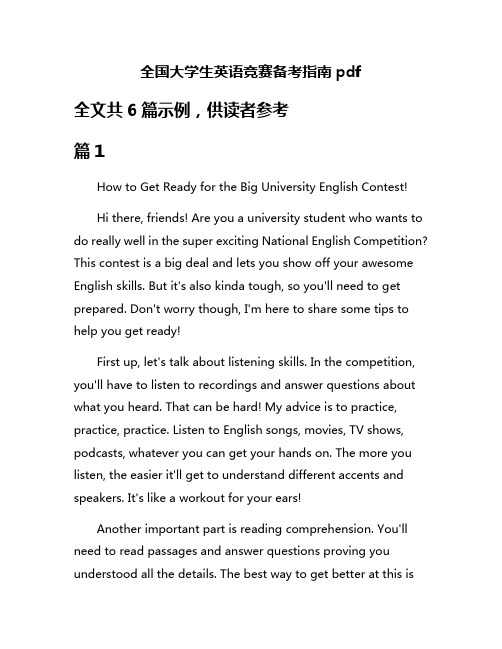
全国大学生英语竞赛备考指南pdf全文共6篇示例,供读者参考篇1How to Get Ready for the Big University English Contest!Hi there, friends! Are you a university student who wants to do really well in the super exciting National English Competition? This contest is a big deal and lets you show off your awesome English skills. But it's also kinda tough, so you'll need to get prepared. Don't worry though, I'm here to share some tips to help you get ready!First up, let's talk about listening skills. In the competition, you'll have to listen to recordings and answer questions about what you heard. That can be hard! My advice is to practice, practice, practice. Listen to English songs, movies, TV shows, podcasts, whatever you can get your hands on. The more you listen, the easier it'll get to understand different accents and speakers. It's like a workout for your ears!Another important part is reading comprehension. You'll need to read passages and answer questions proving you understood all the details. The best way to get better at this isby...you guessed it...reading a ton in English! Read books, magazines, websites, anything that interests you. It'll build your vocabulary and help you get used to different writing styles. Make it fun by picking topics you think are cool.Now let's move on to writing, which is probably one of the trickier parts. You might have to write essays, articles, stories or other pieces in English. The key things to focus on are grammar, spelling, vocabulary, and organization. Read good writing examples to see how it's properly done. And just keep on practicing writing as much as you can - that's how you'll improve!Don't forget about speaking ability too. The competition may have sections where you have to talk or have conversations in English. My advice is to find opportunities to speak English with others as much as possible. If you can make some English-speaking friends, even better! Practicing out loud will make you more comfortable and confident when it's time to talk in the competition.In addition to studying those key skills, it's also smart to look over previous years' competition materials if you can find them. That'll give you a better idea of what types of questions andtasks to expect. Knowing what's coming will help calm those pre-competition jitters!One more really important piece of advice - make sure you take breaks! Studying too much without any rest can just make your brain feel fried. Step away from the books and giving your mind a chance to recharge every so often. Go outside and play, spend time with friends, or just do something you enjoy. Keeping your spirit happy will help keep you motivated.The last thing I'll mention is to believe in yourself! The National English Competition is challenging, but you've got this. If you prepare by practicing those key skills, you'll be giving yourself the best shot at performing well. Don't get discouraged, and remember that making mistakes is okay - that's how we learn and improve.I hope these tips have been helpful for you! Competing can definitely be nerve-wracking, but if you work hard and stay positive, you'll feel ready to show off your fantastic English abilities. Remember to have fun with it too! The competition is a great opportunity to celebrate how far you've come with learning this super cool language.You've got this, friends! Put in the preparation, and you'll feel confident on competition day. Wow the judges with your mad English skills! I'll be cheering you on every step of the way.篇2Getting Ready for the Big English Contest!Hi there! My name is Lily and I'm going to tell you all about how to get super ready for the National English Competition for College Students. This is a really important contest that lets you show off your awesome English skills. Are you excited? I sure am!First up, let's talk about the different parts of the contest. There are four sections: listening, reading, writing, and translation. The listening part means you'll hear some English and have to answer questions about what you heard. For the reading section, you'll read some passages and answer comprehension questions. The writing tests how well you can put your thoughts into words on paper. And for translation, you'll need to translate between English and Chinese. Phew, that's a lot!Now let's go through some tips for each part so you can crush this contest!Listening MasteryThe listening is definitely one of the toughest parts. Here are my best tricks for this section:Watch movies and TV shows in English! This helps train your ear to different accents and speaking styles. Kids shows are great for starting out.Listen to English songs and podcasts too. Singing along is fun practice.Don't panic if you miss something at first. Keep listening and the meaning may become clear.Take good notes as you listen during practice. Jot down key details.Learn common reductions and contractions like "gonna" for "going to". Spoken English is different than written!Reading RockstarFor the reading comprehension questions, you've got to be a book monster! My tips:Read, read, read all the books and stories you can get your hands on in English. Novels, newspapers, magazines – anything!Look up words you don't know and make flashcards to study them.When practicing, skim through the passage first to get the main idea before going into detail.For comprehension questions, go back to the passage and find the evidence for your answers.Don't get stuck on grammar questions. They matter less than understanding the meaning.The Writing WhizShowing your writing skills is so important. Follow these ideas to wow the judges:Practice writing on a variety of topics so you're prepared for anything!Make sure to plan out your essay before writing. An outline helps organize your thoughts.Use lots of examples, details, and reasons to fully support your main ideas.Vary your vocabulary and sentence structures. Boring repetition is a no-no.Leave time at the end to proofread and fix any mistakes!Translation SuperstarLast but not least, the translation section. Here's how to shine:Study the differences between English and Chinese grammar, word order, and phrases.Make flashcards for vocabulary words that are hard to translate directly.When translating to English, think about how a native would naturally say it.Read your translations out loud to catch any awkward phrasing.Practice, practice, practice with all sorts of sample texts until translation becomes second nature.Those are my best tips for conquering each part of the big English competition! The most important thing is to keep working hard, believe in yourself, and don't get discouraged. English is super fun and rewarding when you stick with it.You've got this! Let me know if you need any other advice. I'll be cheering you on!篇3How to Get Ready for the Big English Contest!Hi there, friends! Are you excited about the National English Competition for College Students coming up? I know I am! It's going to be so much fun to test our English skills against students from all across the country. But it's also kind of scary, right? There's a lot to prepare for and practice. That's why I've put together this handy guide to help you get ready. Just follow along and you'll be an English pro in no time!First things first - let's talk about listening comprehension. That's always a big part of any English test. You'll probably have to listen to some recordings or watch some videos and then answer questions about what you heard. Doesn't sound too hard, but it can actually be really tricky!My number one tip is to practice, practice, practice your listening skills. Watch movies and shows in English. Listen to English songs and podcasts. The more you train your ears, the easier it will be to understand when test day comes. You can even find listening practice materials online or get some from your English teacher.When you're practicing, make sure to pay close attention to things like vocabulary, idioms, and different accents. See if you can pick out the key details. Taking notes can also be super helpful for remembering the important points. Oh, and don't get discouraged if you don't understand everything at first. Even native English speakers have trouble sometimes. Just keep at it!Reading comprehension is another biggie for this competition. You'll likely have to read some passages and then answer questions about the main ideas, details, vocabulary, and more. I have a few tricks up my sleeve for conquering those reading sections:First off, don't try to understand every single word when you're reading. That's a rookie mistake! Instead, focus on the overall meaning and context clues to figure out what's going on. Scan for key information like names, dates, and topic sentences.It also really helps to start practicing with short, simple texts and work your way up to longer, more complex stuff over time. Read, read, read anything you can find - books, newspapers, magazines, websites. Mix it up to get experience with different styles and subject matter.And here's a pro tip - take a look at the questions first before you read the passage. That way you'll know what kinds of details and information to watch out for.Let's not forget about the writing section! You'll probably have to do things like write an essay, a story, a report, or even a poem or script. No biggie if you follow my tried-and-true methods:Always, always, ALWAYS plan out what you're going to write before you start. Make an outline or some notes about your main ideas, supporting details, and examples. A strong structure is key for any good writing.Next up, learn those transition words and phrases like "furthermore," "in addition," "however." They'll help your writing flow smoothly from one idea to the next. Using fancier vocabulary is great too, but only if you're sure you're using the words correctly.Pay close attention to grammar, spelling, and punctuation as well. Silly little mistakes can really add up and cost you points. If you have time at the end, be sure to proofread your work.Oh, and one more writing tip - make sure to leave enough time! Don't write a teeny tiny paragraph when you're supposedto be writing a whole essay. But also don't go on and on forever when you should be wrapping things up.Can't forget about speaking for this competition either! There could be sections where you have to answer questions, give a presentation, tell a story, or have a conversation. No need to stress about this though - just think of all the awesome practice you get by, well, speaking English every day!To really nail the speaking sections, focus on things like pronunciation, fluency, vocabulary, and grammar. Listen to plenty of audio examples to help train your mouth muscles and get used to the rhythm and sounds of English. Practice answering sample questions out loud too. You can even record yourself and listen back to catch any mistakes.Don't be afraid to speak slowly and clearly when it counts. It's way better than rushing and stumbling over your words. Oh, and gestures and body language can go a long way too. A friendly smile and some confident hand motions willScore you major points with any judges.Last but not least, there could be a section all about English grammar, vocabulary, idioms, and such. The best way to study for that is by making flashcards, doing practice exercises, takingquizzes, and playing games. Get those grammar rules and word definitions locked into your brain!Most importantly though, the key to success is not stressing out too much! You've been studying English for years, so you've totally got this. Just practice smart, get plenty of rest, and don't forget to have fun with the whole process.I just know you're all going to do amazing at the National English Competition. Hard work, dedication, and a positive attitude are half the battle. Now get out there and show 'em what you can do!That's all from me, friends. Best of luck, and happy studying! Let me know if you need any other tips and tricks.篇4How to Get Ready for the Big English Contest!Hi friends! Are you a college student who wants to do well in the National English Competition? That's a super important test that lets you show off your amazing English skills. My big sister is getting ready for it, and she's been working really hard. I've been watching her and I think I can share some good tips to help you get prepared too!First up, you've got to read, read, read in English as much as you can! My sister is always carrying around novels, newspapers, and magazines from the US and UK. She says reading lots of different things helps her learn new vocabulary words and get used to different writing styles. Whenever she comes across a word she doesn't know, she writes it down to study later.Reading is also great practice for the reading comprehension section of the test. There will be long passages and you'll have to answer questions about the main ideas, details, and vocabulary. My sister warns that the passages can be pretty tricky, so it's important to practice reading carefully and figuring out what the authors really mean.For the listening part of the test, my sister does special listening exercises every day. She finds audio clips or videos in English from news, lectures, movies, and more. Then she has to answer comprehension questions or summarize what she heard. It's just like the real test! Her listening skills are getting so good that she barely needs the Chinese subtitles anymore when we watch Disney movies.The speaking section is another biggie on the test. You'll have to respond to questions and give speeches all in perfect English. No pressure, right? My sister set up a video camera andpractices giving presentations and having conversations. Then she watches the videos to see how she can improve her pronunciation, fluency, and vocabulary usage. Sometimes she even acts out dialogues from movies to work on her speaking!I bet the writing part seems really hard too. You might have to write essays, reports, letters, and more. The graders will be looking for good grammar, a wide range of vocabulary, clear organization, and logical reasoning. My sister is always outlining and drafting her writing samples. She also has a teacher who gives her feedback and corrections. I'm not allowed to read most of her written work yet because she says there's "advanced content" that I'm too young for. Haha, grown-ups are so silly sometimes!In between all of her reading, listening, speaking, and writing practice, my sister is also studying grammar, vocabulary, idiomatic expressions, and test strategies. She uses textbooks, flashcards, apps, and websites to review the rules of English and learn new words and phrases. The competition has a section that specifically tests your knowledge of grammar and vocabulary too. No matter how much English you already know, there's always more to learn!My sister works incredibly hard, but she also takes breaks and has fun while studying. She watches her favorite English TV shows, listens to English songs, and chats with English-speaking friends online. She says enjoyment helps keep her motivated and prevents burnout from too much studying.On test day, the most important things are to get enough sleep, eat a good breakfast, double-check you have everything you need like pencils and ID, and stay calm and confident. You've prepared so well that you'll do amazing! Wouldn't it be so cool to get a medal or trophy from winning the English competition?Well, those are all my top study tips for now. Let me know if you need any more advice from my big sister, the future champion of English! I'll be cheering you on. Study hard, believe in yourself, and do your best. You've got this!篇5Preparing for the Big English Contest!Hi there friends! Are you getting ready for the super duper important National English Competition for College Students? That's a really long name, isn't it? I'll just call it the Big English Contest for short. My older brother is in college and he's been studying really hard to do well on this huge test. I've beenwatching him prepare and I want to share some tips with you on how to get ready for it, just like a big kid!First off, what even is this Big English Contest? Well, it's a major nationwide test that college students from all across China take to show off their English language skills. Thousands and thousands of students compete to see who is the best at listening, reading, writing, and speaking in English. The top scorers get prizes and can brag that they are true English masters! Pretty cool, right?My brother says preparing for this contest is super important if you want to get a good job after college. A lot of big companies look at your scores to see how well you know English. It's kind of like having a superpower in the real world after you graduate. So you better start getting ready now!The first thing you need to do is read, read, read in English as much as you can! My brother has a gigantic stack of books, newspapers, and magazines piled up next to his desk. Whenever I see him, his nose is buried in one of those books. He says reading all those words is helping his brain get better at understanding written English.But don't just read boring textbooks! That would put anyone to sleep. My brother also reads really cool stuff like Harry Potterbooks, Marvel comic books, and even icky mushy romance novels (I tease him about those!). He told me reading for fun helps make learning English feel like a game instead of just studying.You should also be watching movies, TV shows, YouTube videos, anything you can find that is in English! Listening to native English speakers will help train your ears to catch all the different sounds, words, and phrases. My brother loves watching superhero movies like The Avengers. I keep bugging him to watch more kid shows like Peppa Pig with me so I can practice too!Another big part of getting ready is taking a ton of practice tests. There are books and websites that have old versions of the Big English Contest from previous years. My brother prints those out and does them over and over again, trying to finish in the time limit. It's like playing a video game, except you're leveling up your English skills instead of being a cool fighter or something.You can't just read and listen though, you have to practice writing and speaking too. My brother's teacher makes him write short essays and stories every week. His teacher then marks them up with corrections on his grammar, spelling, and all that wichtigstuff. Writing is hard, but keeping a journal or blog where you write in English can help a lot.For speaking, you need to find chances to actually talk out loud in English as much as possible. My brother has English language meetup groups where he goes and chats with other students who are also prepping. He also keeps trying to speak English with my parents, which is hilarious because they don't understand a word and just stare at him blankly! I tease him that he's basically just talking to himself.The most vital thing though is to believe in yourself and stay positive! My brother says he gets stressed out a lot while studying, but he keeps reminding himself that he's working super hard and that he can do well if he keeps at it. Sometimes I have to give him pep talks to cheer him up when he's feeling down about the test. I tell him I know he's going to kick that Big English Contest's butt because he's the smartest big bro ever!Well, those are my top tips that I've learned from watching my brother get ready. It takes a lot of hard work, but you can do it if you make learning English fun. Imagine how awesome you'll feel if you master a whole new language and impress everyone with your skills! Who knows, maybe you'll even inspire little siblings like me to become English experts too someday.I gotta run for now, but let me know if you need any other advice about this Big English Contest thing. I'll be cheering you on every step of the way! Study hard, practice tons, and you're gonna rock this test for sure. Laters gators!篇6Getting Ready for the Big English Contest!Hi there, friends! Are you a university student getting ready for a big English competition? That's super exciting! Contests can be a little scary, but also really fun. I'm going to share some tips with you to get prepared. Just follow along and you'll be an English contest superstar in no time!First things first - you've got to get your body ready! Contests can be pretty long, so you'll need lots of energy. That means eating good foods like fruits, veggies, proteins, and whole grains. They'll help your brain work its best. And don't forget to drink lots of water too! A hydrated brain is a happy brain.Next up is sleeping well. I know it's tempting to stay up super late studying, but that can make you tired and cranky. Try to get 8-10 hours of sleep each night. That way your brain will be well-rested and ready to work hard during the contest.Okay, now for the studying part! One of the most important things is building up your vocabulary. The more words you know, the easier it will be to understand readings and listen to lectures.A fun way to learn new words is using flashcards or apps with word games. You can practice a little bit every day.Reading, reading, and more reading! The more you read in English, the better you'll get at it. Look for books, newspapers, magazines, or websites on topics that interest you. It'll make reading feel like less of a chore. Reading out loud can also really help with pronunciation and fluency.Don't forget about listening practice too! Watch movies, shows, podcasts, or videos in English. Pay close attention and see if you can understand what's being said. If it's too fast at first, use subtitles or transcripts to help follow along.Writing is super important for contests as well. Keep a journal and write about your day, thoughts, or anything else! Getting that writing practice in will make you a stronger writer. You can also do writing prompts and have a friend or teacher give you feedback.Speaking is probably one of the toughest parts of learning English. But practicing is key! You can record yourself reading out loud and listen back to check your pronunciation. Or find afriend learning English to do conversation practice with. The more you speak, the more comfortable you'll become.Grammar study is no fun, but it has to be done. Learn the different grammar rules and do practice exercises. Look out for grammar points you struggle with the most and spend extra time reviewing those. Having solid grammar skills will level-up your English abilities.Here's a bonus tip - when you're practicing reading, writing, listening, or any other skills, keep track of words, grammar points, or anything else you find challenging. Write those down and periodically review the tricky parts until you've mastered them.As the competition gets closer, make sure to get plenty of mock test practice in. Take full, timed practice tests to get used to the format, time pressure, and different question types. Analyze your mistakes so you can learn from them.On contest day, wake up with plenty of time to get ready without rushing. Eat a healthy breakfast with protein and some natural sugars for brain fuel. Drink water and try to stay relaxed! If you've prepared well, you'll do great.Contests can be stressful, but they're also an amazing chance to show off your hard work. Keep a positive mindset,breathe deeply, and give it your all! Remember, mistakes happen - just do your best.Afterwards, be proud of yourself no matter the outcome! Trying your hardest is the most important thing. If there are areas you struggle。
英语竞赛学习方法与技巧指南

英语竞赛学习方法与技巧指南在英语竞赛中获得成功并非易事,需要投入大量时间和精力进行准备。
本文将为您提供一些宝贵的英语竞赛学习方法与技巧指南,帮助您在竞赛中取得优异成绩。
一、听力部分1. 提前准备:提高听力水平需要长期努力,建议日常多听英语音频,比如英语新闻、英语歌曲等。
此外,可以参加听力小组活动或找到一个英语语伴进行日常对话练习。
2. 提高听力速度:在备考过程中,要注重提高听力速度。
可以通过听听力练习软件或参加模拟考试来增加听力材料的难度,逐渐适应快速听写和理解。
3. 注意细节:听力考试经常会涉及细节问题。
在训练过程中,学会筛选出关键信息,特别是数字、日期和地点等信息,这有助于快速回答问题。
二、阅读部分1. 扩大词汇量:阅读是积累词汇最有效的途径之一。
阅读英语材料时,注意标记生词,并进行词汇积累和背诵。
2. 提高阅读速度:阅读速度对于解答问题来说至关重要。
通过进行定时阅读练习,逐渐提升阅读速度和理解能力。
3. 注意文章结构:阅读理解通常涉及文章结构、段落主题和作者观点等。
掌握常见的文章结构模式,比如因果关系、比较对照等,有助于更好地理解文章。
三、写作部分1. 积累写作素材:复习写作部分时,多积累一些常用的写作素材和句型,如各类开头和结尾句式,常用连接词等。
2. 练习写作范文:阅读高分范文,学会模仿其中的优秀表达和写作思路。
同时,可以多进行写作练习,通过找到自己的不足并不断修改,提高写作水平。
四、口语部分1. 练习口语对话:培养和提高口语表达能力需要大量的实践。
与语伴或英语母语者进行对话练习,克服语言障碍,提高发音准确性和流利度。
2. 注重流利度与连贯性:在竞赛中,流利的口语表达至关重要。
练习时要注重练习口语连贯性和自信度,多进行模拟对话并注意语速和停顿的运用。
五、语法与词法1. 牢固掌握基础知识:在备考过程中,要全面复习英语的基础语法知识和常用词汇。
掌握语法规则并进行针对性练习。
2. 错误分析与纠正:对于常见的语法和词法错误,要进行错误分析并及时进行纠正。
- 1、下载文档前请自行甄别文档内容的完整性,平台不提供额外的编辑、内容补充、找答案等附加服务。
- 2、"仅部分预览"的文档,不可在线预览部分如存在完整性等问题,可反馈申请退款(可完整预览的文档不适用该条件!)。
- 3、如文档侵犯您的权益,请联系客服反馈,我们会尽快为您处理(人工客服工作时间:9:00-18:30)。
学长分享英语竞赛技巧:知己知彼百战不殆”,要想在全国大学生英语竞赛中取得好成绩,平时的积累是基础,而考前对考试的研究和分析以及练习则是升华。
近几年来英语竞赛也在不断调整中。
对我们来说,最重要的参考资料就是当年的竞赛样题,和官网的考试说明文件,从中我们可以了解到考试的题型、分值、时间分配、难度和新变化。
只有这样我们才能对症下药,合理分配考试时间,获得最好的成绩。
其实考试,一言以蔽之,就是尽量的规定时间内拿到最高的分数,分数越高,就意味着你越成功。
由于每年试题结构、题型等都会有所变化,下面就以2010年的英语竞赛初赛试题为例,分析一下时间安排。
今年初赛试题共分为七部分,时间120分钟,满分150分。
七部分分别为听力、词汇与语法结构、完形填空、阅读理解、翻译、智力测试和写作。
下面就分别进行分析。
第一部分是听力,由四部分组成,第一部分是五篇短对话,然后是两篇长对话,第三部分是五篇短新闻,第四部分是听写式填空。
总分是30分,总的来说,听力的难度不算很大,应该是介于四、六级之间,大部分都可以直接从对话中找到原句和答案。
但是还是有一定难度的。
首先,前20道选择题都只读一遍,这和一般的考试不同,所以对选手就提出了更高的要求,必须从一开始就高度集中注意力,才能不遗漏重要信息。
此外,听写式填空也是对基本知识的一个考查,经常有同学听到了却不会写,这需要我们打好自己的基础。
这一部分要力争拿到20分以上。
第二部分是词汇与语法结构,这也是对“双基”知识的一个考查,可以说基本上是考查基本功的,当然我们也要注意,这其中对话类的应用题目也呈逐年上升的趋势。
总分15分,官方建议完成时间是十分钟。
这一部分要力争拿到10分以上。
第三部分是完形填空,也是我认为全卷除了智力测试以外最难的题目,题型包括根据上下文填空、根据给出的首字母填空、根据给出的单词的适当形式填空。
分值是十分,官方建议完成时间是10分钟。
这题不仅考查你的基本词汇语法知识,也考查你对文章的理解和把握。
可以说是阅读+词汇的结合。
要拿高分很难,但是其实还是有一些分好拿的,这一部分我们要力争拿到4分以上。
第四部分是阅读理解,总分40分,官方建议完成时间是25分钟。
这是全卷分值最大的一道大题,也是时间最紧的。
我估计绝大多数同学在25分钟内都没办法全部完成(我也很勉强)。
这一部分我觉得最重要的还是把握文章的开头和结尾,了解主旨,然后根据题目去快速定位,因为这里的题目大部分都是在原文可以找到答案的。
这一部分阅读量大、题型多样(包括选择题、问答题、是/否/未提及题,摘抄题、填空题等)、也是对同学英语应用能力的有力考查,还是要熟能生巧,在平时多加练习,力争达到又对又快的境界,这一部分要力争拿到25分以上。
第五部分是翻译,包括英译汉和汉译英两部分。
共20分,官方建议完成时间是15分钟。
这一部分可以说是全卷最简单的题型,考查的内容都没超过四级甚至是平常练习的难度,对英译汉,还是要花点时间看看文章开头和结尾,“磨刀不误砍柴工”,很多翻译都要根据上下文进行,才能更加的到位。
有时在翻译中遇到生词,也可以根据上下文进行推断。
比如今年的汉译英试题中多次提到“dropout”这个单词,我考试时也忘了这是什么意思,最后还是通过文章最后一句中的“tocompletetheireducations”猜出是辍学的意思。
至于汉译英就是我们很熟悉的题型了,注意英语表达的形式就问题不大。
第六部分是英语竞赛最有特色的一块,IQ测试,共5分,官方建议完成时间是5分钟。
这道题目我的最大感觉就是鸡肋。
不过还是很多同学还是不舍得这块,浪费太多时间在这上面,导致后面作文写不完,真是得不偿失啊。
关于时间分配和取舍的问题,我后面还会重点强调。
第七部分是写作,很传统的题目,一道应用文,10分,一道议论文,20分,共30分钟。
官方建议完成时间是30分钟。
一般第一篇是要求100词以上,第二篇是120词以上,这样的要求也就差不多是四级的要求,但是还是有很多同学很遗憾地倒在了这上面,我参加过三次竞赛,每次考完都会听到很多同学抱怨:“这次完了,最后一篇作文没写。
”这是非常令人惋惜的。
因为我觉得以我们大家的水平,这两道题拿个20分以上的分数对大多数同学其实问题不大,你少写了一篇20分的作文,就相当于比别人少了十几分,而这要在前面补回来谈何容易,因为每个小题的分值都不过一到两分而已,差十几分可能就相差了两个档次的奖项(在重点大学可能更甚)。
英语竞赛时间分配及应试技巧:上面分享了本人英语学习的一些经验心得和对考试题型、分值,题量等进行了一些说明。
接下来就来说说很多考生关注的时间分配问题。
英语竞赛里面的题目如果单独跳出来的话,很多都不超过四级的难度要求,甚至比我们平时的练习还简单,但是为什么很多同学都不能取得理想的成绩呢?基础是一方面,而时间分配也很关键。
说说我自己的经验,我们学院是9:40-10:05放C类听力,大约考前十分钟开始发放试题册,一般老师都会提前一点时间发试卷,要抓紧这一块时间,可以先做一些词汇题,然后接着做阅读,我的话这次考试时就在听力前把词汇和阅读做好了,刚好达到官方建议时间。
听力的话时间也没办法挤,而且还要填卡,还要多花2-3分钟。
而完形的话,基本上时间也是很紧的,刚够用而已。
所以我是从翻译挤了五分钟来补。
做完翻译直接挑过IQ题,然后按照官方建议时间把作文好好地写完,最后还剩三分钟,结果还研究出了两道IQ题。
我之前两次参赛也基本用这种方式,也都勉强完成了所有题目,结果也都还好。
所以建议各位同学平时一定要做做样题或者真题,而且要严格按照考试的时间要求做,这样才有效果。
我四级也是提前两个月开始做真题,做了接近二十套,最后提前十分钟完成,获得了592分的高分,全院第四。
后来还去厦大考了本口语证书玩呵呵。
六级我只准备了不到一个月,不过还是取得了524分。
各位如果有能力的话尽量争取四级考到550分以上或者六级考到520分以上,这样就有口语考试资格了,如果这些都考过了还可以准备BEC的考试,总之,学无止境。
如果有些同学觉得自己的速度实在达不到试题的要求的话,我还有一招。
就是听力之前先把作文写好,听力后再把阅读和翻译做好,然后做词汇,最后再做完形和智力题。
因为写作占了30分,听力30分,阅读40分,加上翻译的20分,基本上你的成绩也定型了。
而且这些部分其实难度都不算太高,先把这些题目做好比较值得。
像完形和智力题你可能花了很多时间,最后也拿不到几分,还不如把其他分值大的大题先做好,分值大的题目往往反而不难,很多都是送分题,所以我们要学会取舍,先把大块的分数拿下,有时间再去完善细节。
毕竟,这是竞赛;毕竟,其实90多分就能拿三等奖了(我们学院);在考试时,绝对不能在某些小题上花费太长时间,要先易后难,先把基本分拿到,再去完善细节。
要记得,我难人难,自己不会做的题目往往大多数人也做不出来。
实际上,只要你把握好时间,把自己会做的题目都做好了,我觉得起码拿个三等奖是没问题的。
因为很多人连自己会做的题也因为时间分配不善没拿到(尤其是作文)。
考场细节:接着再谈谈考场上的一些细节问题,不要小看这些细节,“细节决定成败”。
比如考前一定要提前核对自己的考试物品是否准备充分、完好。
不要到时忘了带身份证(准考证)还要到处找老师证明,或者没带铅笔或者耳机去借,这不仅浪费时间,而且会影响我们的心态,不利于我们发挥出水平。
然后对竞赛要以平常心对待,要把这看作一次锻炼、展示自己的机会,不要压力太大,考试时不要有侥幸心理,把注意力放在自己的试卷上。
还有就是要有良好的心态,学会应对一些突发事件。
比如听力录音不清楚的话也不要一味怨天尤人,想想别人也是一样的,尽力去听就好了。
像我去年听力的时候,和我一位同学的听力都在考前几分钟坏了,他没声音,而我居然不小心把天线给折断了。
这时真是“千钧一发”啊。
然而最终我们的结果却是大相径庭,我拿到了二等奖,我同学却榜上无名,这是为什么呢?他发现临时借一个来不及了,想到听力30分没法做了,就觉得考试无望了,结果后面也是乱作一通。
而我却急中生智,用手指捂住天线断口处,坚持听了下去,虽然有一些杂音,不过我后面并没有收到影响,还是正常发挥了自己的水平。
当然这个例子有点极端,但是也从侧面说明了:考场如战场。
不单单是考查对知识的掌握,也是考验一个人的心态、应变能力和抗压能力等。
说了那么多,最后总结一下我心中的大学生英语竞赛的特点:面向绝大多数同学、注重基本知识和应用能力的考查,题量大、阅读量多,题型新颖多变,但是题目本身难度并不是很大。
希望我的一些心得体会能对大家将来参加英语竞赛有所帮助,也希望大家能够通过竞赛来认识更多志同道合的朋友,提高自己的英语能力!简略版本技巧:1.总体看来,这个比赛不仅考程度,而且考速度。
要注意下。
2.听力难度和方式可谓变化多端。
如果听起来很容易,那么题目中肯定有很多陷阱。
反之,譬如说预赛的新闻听力,那些题目往往不会太容易答对。
3.有很多次考试都是把完形填空打散让你选,粗心的考生如果不看题头可能就要中招。
4.阅读量巨大,各种怪模怪样的文章形式都出现过,题目设臵从简答到选择不拘一格。
关键还是心态要冷静。
5.改错难度甚大,许多进入决赛的同学都放弃了这个项目以节省时间。
IQ和猜词也是如此。
前者可以乱选一气,后者就要费点脑筋了,但是不要超过题头建议给你的时间。
6.翻译安排得很靠后,但是其简单程度令人咋舌。
因为前面浪费了时间而不得不放弃此项的同学事后无不捶胸顿足。
哎,毕竟交了15块钱参赛费呢!7.作文在预赛中显得很小儿科,但是决赛中就尽显杀手本色,有一年画了个自行车,标了很多零部件的名称,要我们写它怎么环保。
其实绝大部分名称可以不用理睬。
